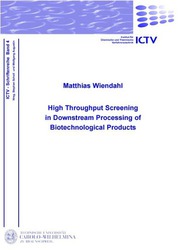| Fachbereiche | |
|---|---|
| Buchreihen (97) |
1381
|
| Nachhaltigkeit |
3
|
| Gesundheitswesen |
1
|
| Geisteswissenschaften |
2370
|
| Naturwissenschaften |
5407
|
| Ingenieurwissenschaften |
1798
|
| Allgemeine Ingenieurwissenschaften | 292 |
| Maschinenbau und Verfahrenstechnik | 863 |
| Elektrotechnik | 690 |
| Bergbau- und Hüttenwesen | 30 |
| Architektur und Bauwesen | 75 |
| Allgemein |
98
|
|
Leitlinien Unfallchirurgie
5. Auflage bestellen |
|
Erweiterte Suche
High Throughput Screening in Downstream Processing of Biotechnological Products (Band 4)
Matthias Wiendahl (Autor)Vorschau
Inhaltsverzeichnis, Datei (38 KB)
Leseprobe, Datei (130 KB)
The aim of this PhD thesis was to establish high throughput screening techniques for the development of downstream processes of biotechnological products. Using the commercially available liquid handling station (LHS) Tecan Freedom Evo® 200 techniques to determine crucial parameters for protein solubility measurements, aqueous two phase systems and chromatographic experiments were developed.
The solubility screening technique developed within this thesis is based on the evaporation of water and a concurrent increase in buffer and protein concentration. The transition of the target molecule from soluble to the precipitated state during evaporation is followed by monitoring UV-absorption. This technique allows screening for the effect of buffer type, concentration or pH on the kinetic solubility of biomolecules such as proteins. The solubility of different insulin analogues was determined and human insulin was used as a model molecule for which the influence of different salts could be ranked according to the Hofmeister series. For aqueous two phase systems techniques for the determination of the characteristic parameters binodal curves, tie lines, phase volumes and concentrations using the LHS have been established allowing a broad parameter screening. A genetic algorithm has been integrated into the screening procedure. This has resulted in a closed loop in which optimization can be performed completely automated. The separation of plasmid DNA from RNA, a purification task which will gain significance with the establishment of gene therapies, has been optimized in this way. A 10-fold scale up was conducted confirming the good purification results. Using LHS-compatible columns and a suitable fractionation device, which had been developed in previous studies, complex elution experiments and breakthrough curves have been performed on the LHS for the first time. Breakthrough curves have been performed with bovine serum albumin as a standard protein for which reference data were available. Elution experiments were conducted with the industrially relevant mixtures of human growth hormone and a process-related contaminant and with a mixture of an insulin analogue and a precursor molecule.
Reference manual or standard laboratory experiments have been performed validating the LHS-based results. The high throughput screening results presented in this thesis have shown to be reliable and reproducible increasing experimental throughput significantly.
| ISBN-13 (Printausgabe) | 3867276358 |
| ISBN-13 (Printausgabe) | 9783867276351 |
| ISBN-13 (E-Book) | 9783736926356 |
| Sprache | Englisch |
| Seitenanzahl | 148 |
| Auflage | 1 Aufl. |
| Buchreihe | ICTV-Schriftenreihe |
| Band | 4 |
| Erscheinungsort | Göttingen |
| Promotionsort | Braunschweig |
| Erscheinungsdatum | 09.07.2008 |
| Allgemeine Einordnung | Dissertation |
| Fachbereiche |
Maschinenbau und Verfahrenstechnik
|
| Schlagwörter | Biotechnologie, Proteine, Aufreinigungstechnik |








